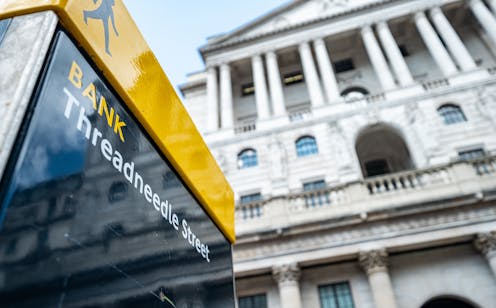Just nine people decide what happens to UK interest rates
- Written by David Spencer, Professor of Economics and Political Economy, University of Leeds

The inflation spike caused by external factors including the Ukraine war might be over, but the importance of interest rates to the UK economy isn’t going away. Continuing global instability and the newly elected Labour government’s commitment to growing the economy mean the Bank of England will have to stay on the lookout for signs of inflation returning.
Even beyond what level to set the country’s interest rate, however, the nine members of the Bank of England’s Monetary Policy Committee[1] (MPC) face lingering questions about how to respond to serious criticism it has received in recent years.
The MPC has come in for flak on several fronts. Firstly, it has been accused of lacking diversity[2] in terms of gender and politics[3]. In response, the committee now has four female members. However, it has yet to include any direct representation from trade unions or consumer groups.
Secondly, there is a question mark over whether the actions of the MPC (like those of the government) have influenced inflation directly. In recent months, inflation has come down less through the effects of higher interest rates than by the downward trend in commodity prices[4]. The MPC’s actions may be more performative than real in affecting high inflation rates.
Thirdly, there is the question of how monetary policy (specifically, the setting of the interest rate) and fiscal policy (government spending and taxation) are coordinated[5]. The danger is that under central bank independence, the two pull in different directions, creating tensions between the MPC and the government.
These tensions can create obvious instability and prevent the pursuit of a more balanced economy. The lack of coordination between monetary and fiscal policy is likely to be more of an issue in the coming months as the government looks to focus on the goal of growth against a background of high interest rates.
Lastly, the MPC has only belatedly addressed the climate issue[6] and has made no material change to monetary policy itself. The focus has been on reporting[7] and acknowledging climate risks rather than tackling them directly – for example, by facilitating[8] energy transition and green finance. There are concerns that the MPC is too focused on one target (lower inflation) and neglects other important goals, including those of sustainable prosperity.
Crucially, the MPC remains independent[9] of any external or political interference. It was set up to take the politics out of monetary policy and operates to ensure that monetary policy is viewed as credible, not least by the financial markets.
This independence, however, has not stopped governments claiming credit[10] for falling inflation even when it is determined by factors outside their direct control.
The nine members – headed by the governor of the Bank of England[11] – also include three deputy governors, a chief economist and four external members with expertise in the field of economics and monetary policy. The external members are appointed by the chancellor of the exchequer and include experts from industry and academia.
The MPC is given formal responsibility by the government for achieving price stability[12]. More directly, it is charged with keeping inflation at 2%. If the inflation target is missed by one percentage point (that is, if it is higher than 3% or lower than 1%), the governor has to write to the chancellor[13] explaining the reasons for missing it.
MPC members meet eight times a year (around every six weeks) to set the interest rate, taking into account information they receive from Bank of England regional agents and using models that evaluate trends in inflation and inflationary expectations.
The idea is that interest rate changes can be used to affect economic activity and inflation through several channels known as the transmission mechanism[14]. The impact of interest rate changes are felt largely through changes in consumption and investment.
An interest rate cut, for example, would be expected to increase the amount households and firms spend and would be appropriate where inflation is anticipated to fall below the target.
Then-chancellor Gordon Brown handed back operational independence to the BoE on his first full day in the job in 1997.So where next for monetary policy? It seems likely that the independence of the Bank of England is here to stay. But economic challenges in the future (not least continued sluggish growth[15] rates) might create pressure for a review of current policy frameworks.
This could mean widening the membership of the MPC and ensuring better coordination between its actions and those of the government. It might also mean that the MPC focuses more directly on issues of ecological and economic sustainability. The European Central Bank has put out a climate action plan[16], although it is quite thin on specific details.
For the new Labour government, the challenge of reviving the fortunes of the UK economy is likely to mean facing up to reforms in both monetary and fiscal policy. Without them, securing the elusive goal of sustainable economic growth may prove even more difficult.
References
- ^ Monetary Policy Committee (www.bankofengland.co.uk)
- ^ lacking diversity (committees.parliament.uk)
- ^ politics (publications.parliament.uk)
- ^ commodity prices (blogs.worldbank.org)
- ^ coordinated (ukandeu.ac.uk)
- ^ climate issue (blogs.lse.ac.uk)
- ^ reporting (www.bankofengland.co.uk)
- ^ facilitating (www.imf.org)
- ^ independent (www.theguardian.com)
- ^ claiming credit (news.sky.com)
- ^ governor of the Bank of England (www.bankofengland.co.uk)
- ^ price stability (www.ft.com)
- ^ chancellor (theconversation.com)
- ^ transmission mechanism (www.bankofengland.co.uk)
- ^ sluggish growth (theconversation.com)
- ^ climate action plan (www.ecb.europa.eu)







